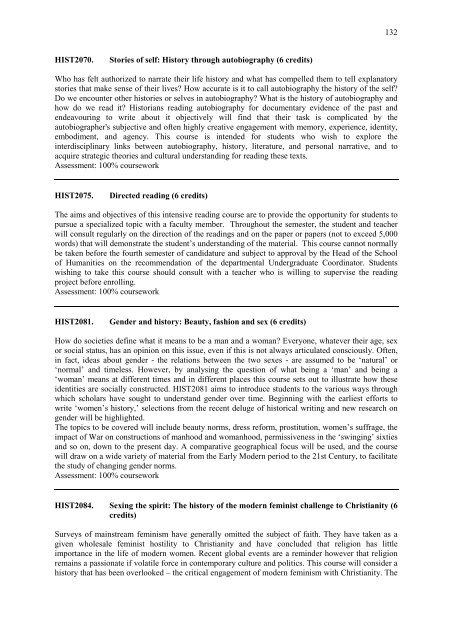(BA) (4-year-programme) - The University of Hong Kong
(BA) (4-year-programme) - The University of Hong Kong
(BA) (4-year-programme) - The University of Hong Kong
You also want an ePaper? Increase the reach of your titles
YUMPU automatically turns print PDFs into web optimized ePapers that Google loves.
132HIST2070.Stories <strong>of</strong> self: History through autobiography (6 credits)Who has felt authorized to narrate their life history and what has compelled them to tell explanatorystories that make sense <strong>of</strong> their lives? How accurate is it to call autobiography the history <strong>of</strong> the self?Do we encounter other histories or selves in autobiography? What is the history <strong>of</strong> autobiography andhow do we read it? Historians reading autobiography for documentary evidence <strong>of</strong> the past andendeavouring to write about it objectively will find that their task is complicated by theautobiographer's subjective and <strong>of</strong>ten highly creative engagement with memory, experience, identity,embodiment, and agency. This course is intended for students who wish to explore theinterdisciplinary links between autobiography, history, literature, and personal narrative, and toacquire strategic theories and cultural understanding for reading these texts.Assessment: 100% courseworkHIST2075.Directed reading (6 credits)<strong>The</strong> aims and objectives <strong>of</strong> this intensive reading course are to provide the opportunity for students topursue a specialized topic with a faculty member. Throughout the semester, the student and teacherwill consult regularly on the direction <strong>of</strong> the readings and on the paper or papers (not to exceed 5,000words) that will demonstrate the student’s understanding <strong>of</strong> the material. This course cannot normallybe taken before the fourth semester <strong>of</strong> candidature and subject to approval by the Head <strong>of</strong> the School<strong>of</strong> Humanities on the recommendation <strong>of</strong> the departmental Undergraduate Coordinator. Studentswishing to take this course should consult with a teacher who is willing to supervise the readingproject before enrolling.Assessment: 100% courseworkHIST2081.Gender and history: Beauty, fashion and sex (6 credits)How do societies define what it means to be a man and a woman? Everyone, whatever their age, sexor social status, has an opinion on this issue, even if this is not always articulated consciously. Often,in fact, ideas about gender - the relations between the two sexes - are assumed to be ‘natural’ or‘normal’ and timeless. However, by analysing the question <strong>of</strong> what being a ‘man’ and being a‘woman’ means at different times and in different places this course sets out to illustrate how theseidentities are socially constructed. HIST2081 aims to introduce students to the various ways throughwhich scholars have sought to understand gender over time. Beginning with the earliest efforts towrite ‘women’s history,’ selections from the recent deluge <strong>of</strong> historical writing and new research ongender will be highlighted.<strong>The</strong> topics to be covered will include beauty norms, dress reform, prostitution, women’s suffrage, theimpact <strong>of</strong> War on constructions <strong>of</strong> manhood and womanhood, permissiveness in the ‘swinging’ sixtiesand so on, down to the present day. A comparative geographical focus will be used, and the coursewill draw on a wide variety <strong>of</strong> material from the Early Modern period to the 21st Century, to facilitatethe study <strong>of</strong> changing gender norms.Assessment: 100% courseworkHIST2084. Sexing the spirit: <strong>The</strong> history <strong>of</strong> the modern feminist challenge to Christianity (6credits)Surveys <strong>of</strong> mainstream feminism have generally omitted the subject <strong>of</strong> faith. <strong>The</strong>y have taken as agiven wholesale feminist hostility to Christianity and have concluded that religion has littleimportance in the life <strong>of</strong> modern women. Recent global events are a reminder however that religionremains a passionate if volatile force in contemporary culture and politics. This course will consider ahistory that has been overlooked – the critical engagement <strong>of</strong> modern feminism with Christianity. <strong>The</strong>
















